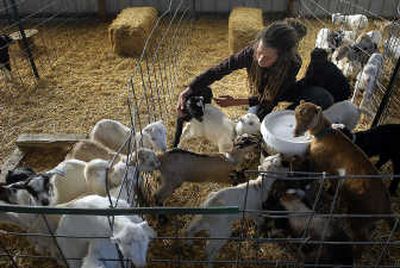Montana family runs organic goat dairy farm

BELGRADE, Mont. – On a small farm on Penwell Bridge Road, making goat cheese is a family affair.
Melvyn Brown, 55, milks the goats. His son, Nate, 23, makes the cheese. Melvyn’s wife, Sue, handles the books. And his daughter, Sarah, 21, worked on the farm until moving away last year.
“Everybody in my family knows the cheese-making process,” Sue said. “We do everything from beginning to end.”
The Amaltheia Organic Dairy may be a mom-and-pop operation, but it also happens to be the only organic goat dairy in Montana. Last year it shipped 80,000 pounds of cheese to restaurants and groceries across the country.
The goats are milked outside the Browns’ home, and the cheese – including plain chevre, flavored chevre, whole milk ricotta and feta – is made at a small factory in Belgrade.
“There are not too many organic goat-cheese makers in the country, so to be doing it here is pretty cool,” Nate Brown said. “We get to watch over the entire process from the milking of the goats to the transportation of the milk and the making of the cheese.”
Filling a niche market
Melvyn Brown grew up a cattleman in northern England. He and his wife have always had dairy goats. They raised their two children on goat milk.
Brown used to do embryo transplants in cattle. But eight years ago, after he was kicked by a cow and injured, he decided he’d like to milk goats and make goat cheese – known as chevre, after the French word for goat – full time.
Three years later, Amaltheia opened its own cheese factory.
It’s a labor of love. The Browns work 16 hours a day, seven days a week, milking the goats, cleaning and maintaining the farm.
The Browns named the dairy Amaltheia after the goat that nursed Zeus in ancient Greek mythology. Zeus later rewarded Amaltheia by placing her image in the sky and calling the constellation Capricorn.
The Browns figured goat cheese would fill a niche. The milk contains less lactose and digests faster than cow’s milk, so it is less likely to bother people who are lactose intolerant, Sue Brown said. Because it has similar qualities to human milk, goat milk is sometimes used to feed infants.
“We have a very clean, very mild goat cheese,” Sue said. “We have a very mild product and we can guarantee the freshness and the cleanliness.”
Going organic was an effort to distinguish Amaltheia from other goat cheeses, but it also fit the family’s lifestyle.
“My kids grew up on a farm. They grew up eating organic food. They don’t get sick,” Sue said. “I believe in organics, and I believe that the food that we eat is causing the diseases and sicknesses of today.”
To maintain the dairy’s organic designation, the goats are given organic feed bought in Montana; no pesticides or fertilizers are used on the farm; and the animals are never given antibiotics.
The dairy has matured into a full-fledged business. The family employs six people at the farm and cheese factory.
Life on the farm
On the Browns’ farm, 140 baby goats ranging from 5 days to 6 weeks old are kept in an outbuilding, being raised as replacement stock.
Neighbors, adults and children, come over to play with the animals and feed the babies bottles of milk.
“I come over every day,” neighbor Judy Rente said. “I love them. These are just the funniest animals.”
The babies are kept in pens, although a few stroll freely around the farm and enjoy being hugged and petted. Much like dogs, the goats are domesticated and enjoy attention. They have names. They listen and come when they’re called.
“They’re all wonderful, but there are always a handful that we fall in love with,” Rente said.
Across from the baby goats, 220 milking goats are penned in another outbuilding. The milking parlor, which is large enough to milk 10 goats at a time, is nearby.
The animals are milked twice a day, at 4:30 a.m. and 3:30 p.m. Each goat produces nearly a gallon of milk a day.
The cheese factory
When the goats have been milked and the milk pumped into a tanker truck, Nate Brown drives the milk truck to the cheese factory, a large building in Belgrade’s iPark along the frontage road.
The factory consists of an office, a packaging room and a cheese-making room.
In the cheese-making room, a floor-to-ceiling tank holds the milk. Nate Brown makes sure the milk is cooled, stirred and set. He cuts and molds it into cheese.
Nate said the milk’s temperature, precise measurements and timing are crucial.
“The main trick is a lot of attention to detail,” he said. “I do enjoy it a lot. I’ve done it for a while. It’s pretty fun and laid back. I get to make my own schedule.”
It takes a few days to make one batch of chevre. Feta takes a week.
Once the cheese is made, it’s shipped to restaurants and groceries across the country. The dairy also works with Whole Foods Market and Sysco Food Services. The dairy hopes to sell 100,000 pounds of cheese this year.
“We’re really pleased with the way things are going,” Melvyn Brown said.